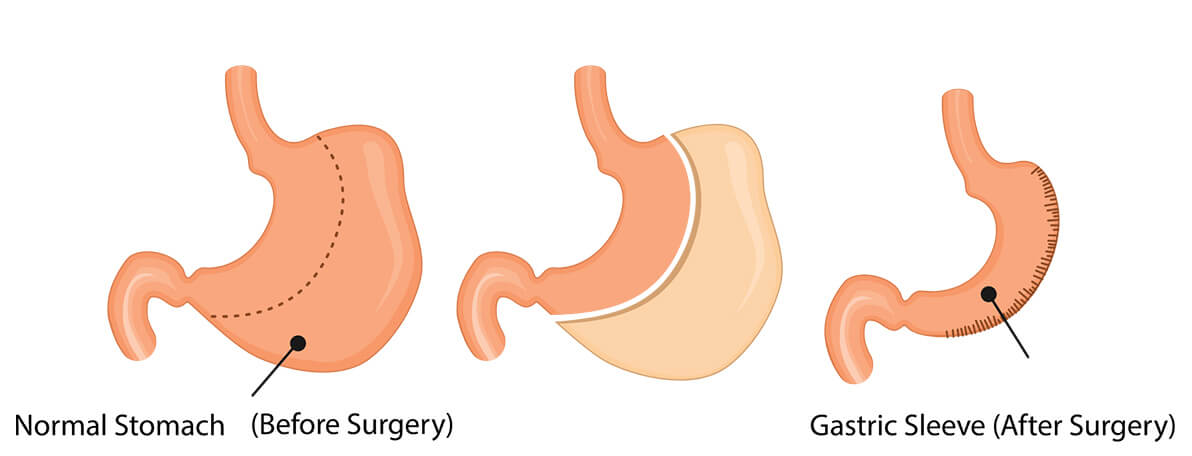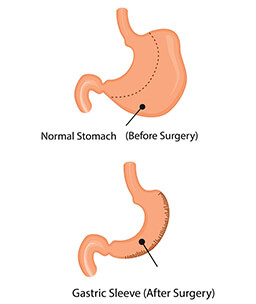What Is A Sleeve Gastrectomy?
Gastric sleeve surgery or sleeve gastrectomy is a bariatric procedure that involves reducing the size of your stomach to limit the amount of food you can eat, helping you lose excess weight, when dieting and exercise alone does not work.
This limiting procedure works by permanently removing a large portion of your stomach so it can only hold a small amount of food. Sleeve gastrectomy also removes the part of the stomach that produces the hunger-stimulating hormone ghrelin to decrease your appetite. After the procedure, you will feel full after eating much less and be less hungry between meals.
Some advantages of gastric sleeve surgery include a relatively short hospital stay, requires no rerouting of the food stream, causes favorable changes in gut hormones to suppress hunger, reduce appetite, and improve satiety.


What Qualifies You For A Sleeve Gastrectomy?
In order to qualify for a gastric sleeve surgery, the general requirements are:
-
Severe obesity (class III): Obesity is determined by your body mass index or BMI, which is calculated using your weight in kg divided by your height in m^2. Class III obesity refers to a BMI of 40 or higher, or a BMI of at least 35, along with at least one obesity-related disease. Occasionally, gastric sleeve surgery is done if the patient has a serious health condition related to weight even if the patient is only overweight and not obese.
-
Previous weight loss attempts: Gastric sleeve surgery is not recommended as the first round solution to weight loss. It is necessary for you to have made efforts to lose weight in the past, even if those attempts were unsuccessful, as this surgery is only considered an option when strong attempts to improve your diet and exercise habits haven't worked.
-
Psychological evaluation: Prior to qualifying for any weight loss surgery, you will undergo a comprehensive evaluation to check your physical and emotional readiness. This will likely include consultations with dietitians, psychologists, and other medical specialists who will assess whether you are ready for the surgery and the recovery process.
If you are unsure whether you qualify for this surgery, you should consult with our medical professionals for personalized assessment and guidance.
Advantages of Sleeve Gastrectomy
Weight loss
After a sleeve gastrectomy, your smaller stomach still functions relatively normally, meaning that you will be able to tolerate most foods, just in smaller amounts.
Since this surgery limits the upper portion of your stomach which is the area that produces the hormones that stimulate hunger, your appetite often decreases as well. This leads to significant long-term weight loss, leading to overall improved health.
Reduction in obesity-related medical conditions
By losing weight and reducing excess body fat, some may experience improvement in obesity-related conditions such as high cholesterol, high blood pressure, type 2 diabetes, and metabolic syndrome.
The reduction in these conditions can also help by reducing the reliance on medication, which leads to better long-term health outcomes.
Improved quality of life
Losing weight and achieving a healthier body can result in increased energy levels, mobility, and overall physical well-being.
People who undergo this surgery often report enhanced self-esteem and body image, which as a result, ensures improved confidence and mental well-being.
Lower risk compared to other bariatric surgeries
Comparatively, gastric sleeve surgery is a lot simpler, safer, and quicker, as even people with health conditions that might not be suitable for longer procedures can tolerate a sleeve gastrectomy. It is a less invasive procedure, and therefore is considered a lower-risk compared to other bariatric surgeries.
The surgery is also one that doesn't involve intestinal bypass or rerouting, which means that it is much less likely to cause any complications associated with these procedures, as well as any long-term nutritional complications.
The shorter duration of the surgery also reduces the risk of complications while minimizing the recovery time.
How It Works
The procedure is performed laparoscopically, using keyhole surgery, under general anesthesia, and usually takes between an hour and an hour and a half.
During the procedure, our bariatric surgeon will make several small incisions in your stomach to insert the laparoscope and other surgical tools to partition your stomach.
The right part of the stomach containing Ghrelin hormones is removed with surgical instruments, while the left side of the stomach is sectioned off to provide a smaller tube-shaped stomach.
The sphincter muscles in the upper and lower stomach are retained, and the new stomach, reduced between 45 to 75 percent, is tubular shaped.
Once the procedure is complete, the surgeon will use dissolving sutures and sterile tape to seal the incision site to allow for healing.
Before Surgery
Once you have passed your health screening and are a candidate for gastrectomy surgery, you will need to begin a two-week liquid diet. We will give you specific guidelines to follow for this.
This is followed so that you will be able to lose some of the fat in your abdomen and liver, making the procedure safer.
Moreover, any food or liquid that is left in your stomach during the surgery could end up causing unpleasant or even dangerous side effects.
Accordingly, you will be asked not to eat or drink anything for at least 12 hours before your operation to ensure that your stomach is empty during the procedure.
Recovery and Post-operative Care
Hospital Stay and Immediate Recovery Period
Following sleeve gastrectomy, patients will typically stay in the hospital for two to three days for monitoring and in order to manage any potential post-operative pain or complications.
We will closely observe your vital signs, provide pain management, administer necessary medications and monitor the healing process of the incision.
Dietary Guidelines and Progression of Food Intake
After sleeve gastrectomy, patients will be put on a specific diet plan that is designed to aid in the healing process and promote weight loss. Initially, this will involve a liquid diet for 1 to 2 weeks. Gradually this will progress to pureed or soft foods and then eventually solid foods.
You will be given specific advice on portion control, nutrient intake, and maintaining a balanced diet in order to support your weight loss journey and prevent any complications while your stomach heals. Meals after your surgery will be small, and you should focus on chewing your food thoroughly.
Additionally, as some vitamins and minerals might be harder to obtain through smaller meals, you may also need to take some supplements.
Physical Activity Recommendations
An important aspect of the recovery process after this procedure is engaging in regular physical exercise. Patients should start with gentle movements and gradually increase their activity level as they recover.
This can involve walking, light aerobic exercises, and strength training to build muscle mass and boost metabolism.
Emotional and Psychological Support
While this procedure is mainly to ensure physical health, it also has emotional and psychological ramifications.
Emotional support can play a vital role in helping patients cope with the challenges and adjustments that come with the surgery and lifestyle changes that are required.
Counseling or therapy is recommended if there are any underlying emotional issues that are related to food, body image, and self-esteem.
Risks and Considerations
Potential Complications
While this is a relatively safe procedure, as with any surgical procedure, sleeve gastrectomy has potential risks and complications.
Some issues that can occur after almost any surgery include bleeding, infection, deep vein thrombosis, pulmonary embolism, irregular heartbeat, and pneumonia.
The risk of side effects specific to this surgery are rare but it is important that you are aware of them. These can include:
-
Gastric leaks: Where stomach fluids leak from the suture line in your stomach
-
Stenosis: When part of your gastric sleeve closes, causing an obstruction in your stomach
-
Vitamin deficiencies: As the section of your stomach that is removed is partly responsible for vitamin absorption, you can experience vitamin deficiencies.
-
Heartburn: Reshaping your stomach can cause heartburn or potentially make your existing heartburn worse. However, this can usually be treated with over-the-counter medication.
Irreversible Procedure
Unlike some other bariatric surgeries, gastric sleeve surgery is irreversible, meaning that if you are not happy after the surgery with the outcome, your stomach cannot be changed back to the way it was.
Importance of Post-Operative Care
Post-operative care and regular follow-up appointments are necessary in order to monitor your progress, manage complications and adjust your treatment plan if needed. We will provide guidance to support your long-term success and deal with any of your concerns.
Long-Term Commitment to Lifestyle Changes
Undergoing a sleeve gastrectomy for weight loss means that you are going to have to make significant lifestyle changes in order to support your long-term success.
This includes adopting healthier eating habits, portion control, regular exercise, and behavioral changes relating to your food choices and eating patterns.
These are going to be lifelong changes that you will be required to commit to following this procedure, as it is always possible to gain the weight back if you eat unhealthily, eat too much, or exercise too little.
Excess Skin
When you lose a lot of weight within a small time frame, you will likely be left with large amounts of excess skin.
While this can be surgically removed if it is a source of bother or self-consciousness, you should keep in mind that it can take up to 18 months for your body to stabilize after this surgery. That is why it is usually best to wait before considering a skin removal procedure.
Nutritional Considerations
Since nutritional deficiencies are a risk, particularly when it comes to vitamin B12, iron, calcium, and vitamin D, it is essential to monitor your condition regularly following the procedure and take the required amount of supplements to prevent this.
BOOK Now
Make An Appointment
-

+971502343442
Contact Dr. Samir if you have any questions
-

Visit
02 Jumeirah Beach Rd - opposite Burj Al Arab - Umm Suqeim - Jumeirah 3 - Dubai
Opening Hours:
9am-9pm (Saturday- Thursday)
9am-6pm (Saturday)




